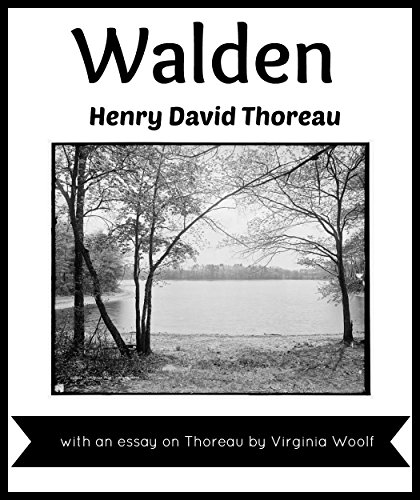-
Walden
Henry David Thoreau, Virginia Woolf
eBook (apebook Verlag, March 30, 2015)In 1845, Henry David Thoreau moved into his cabin at Walden Pond to conduct his living experiment on how to simplify one's life. What came out of it was one of the most influential books of the 19th century.This edition of Henry David Thoreau's 1854 classic, Walden, is accompanied by an essay written by Virginia Woolf in 1917. The essay, published in the Times Literary Supplement in London on the 100th anniversary of Thoreau's birth, is an insightful, thoughtful and intelligent tribute to Thoreau and his work. Whether you are a fan of Thoreau, Woolf or both, you will thoroughly enjoy and treasure this special edition of Walden.
-
Walden
Henry David Thoreau
Paperback (Chump Change, Dec. 21, 2016)Henry David Thoreau, noted transcendentalist, wrote Walden as a reflection upon simple living in natural surroundings. The work is part personal declaration of independence, social experiment, voyage of spiritual discovery, satire, and manual for self-reliance. Nature was a study for the essayist, naturalist, and environmentalist David Thoreau. He communed from his cabin on Walden Pond, owned by Ralph Waldo Emerson, to “live deliberately, to front only the essential facts of life, and… learn what it had to teach.” Walden is landmark book on self-reliance and simple living.
-
Walden
Henry David Thoreau
Paperback (Everyman Paperbacks, April 15, 1995)I should not talk so much about myself if there were anybody else whom I knew as wellEschewing a conventional residence and lifestyle, Thoreau set up home in the woods on the shore of Walden Pond in Massachusetts, a mile from his nearest neighbor, and earned his living by labor of his own hands. Most people, he says are so occupied with the factitious care and toils of life that its finer fruits remain unplucked. So he went to Walden in an attempt to find, in the seemingly simple routines of life stripped to its essentials, the shape beneath what is apparently chaotic.Walden describes Thoreau's domestic economy, the wildlife , the few visitors to his remote wooden hut, and his reflections on the quality of human life in age of growing materialism and of prevailing work ethic. It has become poignant critique of the values of Thoreau's society which retains its relevance and extraordinary power today. A comprehensive paper edition, with an introduction and chronology of Thoreau's life and times
-
Walden
Henry David Thoreau
Paperback (CreateSpace Independent Publishing Platform, June 11, 2017)Walden (first published as Walden; or, Life in the Woods) is a book by noted transcendentalist Henry David Thoreau. The text is a reflection upon simple living in natural surroundings. The work is part personal declaration of independence, social experiment, voyage of spiritual discovery, satire, and (to some degree) manual for self-reliance.
-
Walden
Henry David Thoreau, D. Cok
eBook (Green Reader Publishing, March 15, 2016)Walden (first published as Walden; or, Life in the Woods), by noted transcendentalist Henry David Thoreau, is a reflection upon simple living in natural surroundings. The work is part personal declaration of independence, social experiment, voyage of spiritual discovery,satire, and manual for self-reliance. Thoreau also used this time to write his first book, A Week on the Concord and Merrimack Rivers.
-
Walden
Henry David Thoreau, Adam Morgan
2014 (The Classic Collection, Aug. 5, 2014)Part memoir and part spiritual quest, Walden is the compelling account of daily life at Walden Pond by the noted transcendentalist and author Henry David Thoreau.Detailing over two years of Henry David Thoreau's life, Walden chronicles his transcendentalist journey to live in the wilderness and immerse himself in nature. The result is this classic work on self-reliance and individual freedom. Since its first publication, Walden has become a mainstay in American literature, "…a personal declaration of independence, a social experiment, and a voyage of spiritual discovery.…" (The Library of America).
-
Walden
Henry David Thoreau
Paperback (CreateSpace Independent Publishing Platform, Dec. 11, 2017)Walden is a book by noted transcendentalist Henry David Thoreau. The text is a reflection upon simple living in natural surroundings. The work is part personal declaration of independence, social experiment, voyage of spiritual discovery, satire, and—to some degree—a manual for self-reliance. First published in 1854, Walden details Thoreau's experiences over the course of two years, two months, and two days in a cabin he built near Walden Pond, amidst woodland owned by his friend and mentor Ralph Waldo Emerson, near Concord, Massachusetts. Thoreau used this time to write his first book, A Week on the Concord and Merrimack Rivers. The experience later inspired Walden, in which Thoreau compresses the time into a single calendar year and uses passages of four seasons to symbolize human development. By submersing himself in nature, Thoreau hoped to gain a more objective understanding of society through personal introspection. Simple living and self-sufficiency were Thoreau's other goals, and the whole project was inspired by transcendentalist philosophy, a central theme of the American Romantic Period. Thoreau makes precise scientific observations of nature, as well as metaphorical and poetic use of natural phenomenon. He identifies many plants and animals by both their popular and scientific names, records in detail the color and clarity of different bodies of water, precisely dates and describes the freezing and thawing of the pond, and recounts his experiments to measure the depth and shape of the bottom of the supposedly "bottomless" Walden Pond.
-
Walden
Henry David Thoreau
Paperback (CreateSpace Independent Publishing Platform, Nov. 12, 2015)Walden is one of the best-known non-fiction books ever written by an American. It details Thoreau's sojourn in a cabin near Walden Pond, amidst woodland owned by his friend and mentor Ralph Waldo Emerson. Walden was written with expressed seasonal divisions. Thoreau hoped to isolate himself from society in order to gain a more objective understanding of it. Simplicity and self-reliance were Thoreau's other goals, and the whole project was inspired by Transcendentalist philosophy. This book is full of fascinating musings and reflections. As pertinent and relevant today as it was when it was first written.
-
Walden
Henry David Thoreau
Hardcover (Simon & Brown, Sept. 20, 2016)None
-
Walden
Henry David Thoreau
Paperback (SC Active Business Development Srl, April 29, 2017)Walden (first published as Walden; or, Life in the Woods) is an American book written by noted transcendentalist Henry David Thoreau, a reflection upon simple living in natural surroundings. The work is part personal declaration of independence, social experiment, voyage of spiritual discovery, satire, and manual for self-reliance. First published in 1854, it details Thoreau's experiences over the course of two years, two months, and two days in a cabin he built near Walden Pond, amidst woodland owned by his friend and mentor Ralph Waldo Emerson, near Concord, Massachusetts. The book compresses the time into a single calendar year and uses passages of four seasons to symbolize human development.
-
Walden
Henry David Thoreau, Mel Foster
2008 (Tantor Audio, May 19, 2008)Walden is the classic account of two years spent by Henry David Thoreau living at Walden Pond near Concord, Massachusetts. The story is detailed in its accounts of Thoreau's day-to-day activities, observations, and undertakings to survive out in the wilderness for two years. Thoreau's journal is an exquisite account of a man seeking a more simple life by living in harmony with nature. In today's fast-paced consumer-driven society, the austere lifestyle endorsed by Thoreau is as relevant and refreshing as ever.
-
Walden
Henry David Thoreau, Mel Foster
MP3 CD (Tantor Audio, May 19, 2008)Walden is the classic account of two years spent by Henry David Thoreau living at Walden Pond near Concord, Massachusetts. The story is detailed in its accounts of Thoreau's day-to-day activities, observations, and undertakings to survive out in the wilderness for two years. Thoreau's journal is an exquisite account of a man seeking a more simple life by living in harmony with nature. In today's fast-paced consumer-driven society, the austere lifestyle endorsed by Thoreau is as relevant and refreshing as ever.